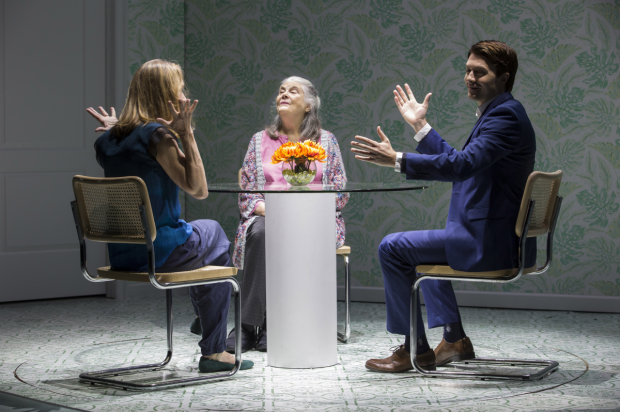Marjorie Prime

(© Jeremy Daniel)
Upon first glance, Walter (Noah Bean) looks like your everyday thirtysomething. He's tall and handsome, impeccably dressed in a stylish blazer. But Walter isn't an average person; Walter is a "Prime": a lifelike hologram procured by those in mourning to provide comfort in the form of their deceased loved ones.
Walter belongs to Marjorie (Lois Smith), the title character of Jordan Harrison's beautiful new play, Marjorie Prime, at Playwrights Horizons. Marjorie is an 85-year-old with symptoms of dementia, who has been feeding what she can recall about her life into Walter, a much younger, computerized doppelgänger of the late husband who bore the same name. His job is to stimulate her fading brain, regaling her with stories like how they saw My Best Friend's Wedding on the night they got engaged, but knows nothing more than what he's been programmed to say.
Marjorie's brittle, argumentative daughter, Tess (Lisa Emery), has a hard time dealing with this intruder, who isn't her father but knows the intimate details of his life (except a major one). Tess' husband, Jon (Stephen Root), is more adaptive to their new friend, providing him with stories, both true and embellished, of Marjorie's youth and her past gentleman callers. The more they tell a Prime, the more "real" it becomes.
As a writer, Harrison is heavily influenced by the assets and pitfalls of technology. His last work, the delightfully offbeat comedy Maple & Vine (2011), followed a pair of city dwellers fed up with contemporary life as they relocate to a community where it's perpetually 1955. Part mystery, part exploration of depression and repression, Marjorie Prime, directed by Harrison's Maple collaborator Anne Kauffman, is set in a phenomenally intriguing future world where personal mythology can be molded and reshaped with the help of scientific machinery.

(© Jeremy Daniel)
But even the most sophisticated programs can't prevent the sadness that comes with years upon years of grief and repression. Harrison is also examining how a family deals with a long-ago death that is simultaneously hidden from and ever-present in the mind. Even if one tries to erase it from the narrative — which can be done in the presence of a "Prime" simply by not talking about it — it's still there, sharp as ever.
One of the more impressive aspects of Marjorie Prime, a finalist for the 2015 Pulitzer Prize for Drama, is how Harrison calls upon spectators to be active viewers (a trait missing from many plays of late). Rather than deal in specifics, he provides context clues for us to piece together the timeline and personal histories ourselves (for example, Marjorie was born in 1977 and she's currently 86.) Crucial details about her story and others are told to Primes rather than seen (a trait that most Playwriting 101 classes would advise against). But it works here because the dialogue and performances are so strong, it's like we're viewing these moments firsthand.
Two members of Kauffman's impeccable cast, Smith and Emery, originated their roles in the 2014 Mark Taper Forum world premiere production of the play, directed by Les Waters. At 85, Smith is eternally brilliant, and Emery is ever much her equal. Smith revels in the ambiguity that comes with senility, painting an exquisitely recognizable portrait of a formidable woman's final years, where the body fails and memories are relegated to hazy clouds of once-familiar tales and song lyrics. "If you like it then you shoulda put a ring on it," she sings over and over, unable to name the song that other characters similarly don't recognize (for various reasons).
As Tess, Emery is very much what her mother must have been decades earlier: an exposed nerve desperate for affection, but who refuses admit it. The men are equally strong counterparts, with the earthy Root breaking our hearts in the play's climactic moments and the attractive Bean playing the ideal robotic companion with human traits.
Kauffman's staging is best described as the sci-fi version of film noir. This idea is only further enhanced by the living room set, by Laura Jellinek, which features forest-green wallpaper, carpeting, and furniture, calling to mind both The Jetsons and The Twilight Zone. Jessica Pabst's everyday costumes help the play feel like a future that very closely resembles our current world. Daniel Kluger's incidental-music score, saved mostly for scene changes, sounds like it could have escaped from a Hitchcock film (so too does Ben Stanton's alternately bright and shadowy lighting, which heightens the noir vibe).
If there's a downside to Marjorie Prime, it's the final scene, which is less a logical conclusion and more a needed escape from the hole in which Harrison willingly backs himself. Still, thanks to the expert cast and wonderfully sensitive writing, it's a supremely emotional moment, one that will undoubtedly cue waterworks. Word to the wise: bring tissues.

(© Jeremy Daniel)










